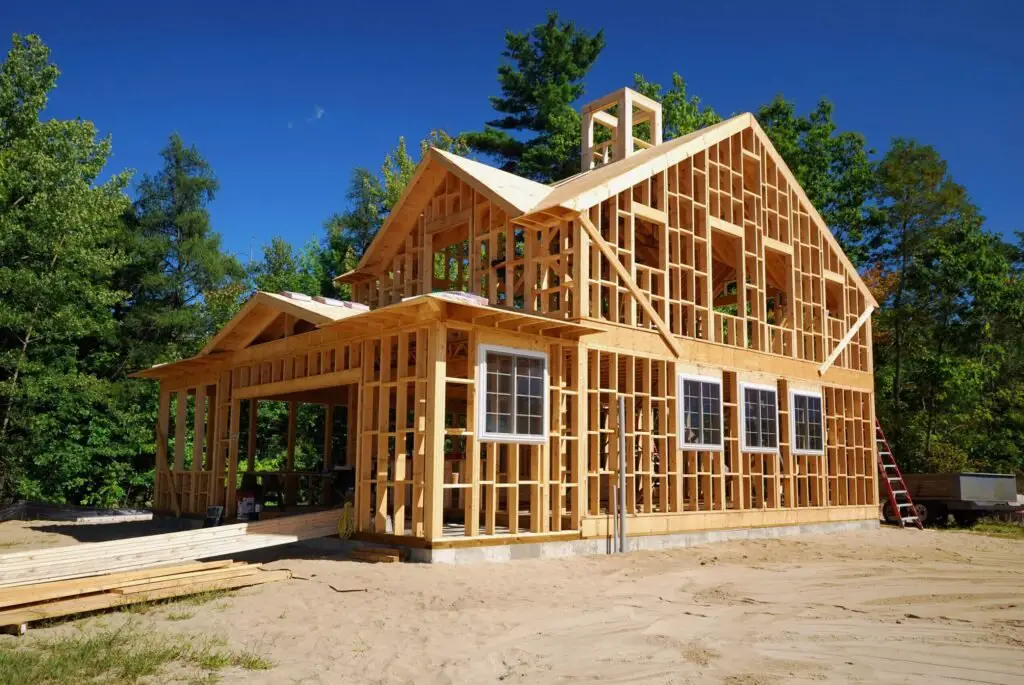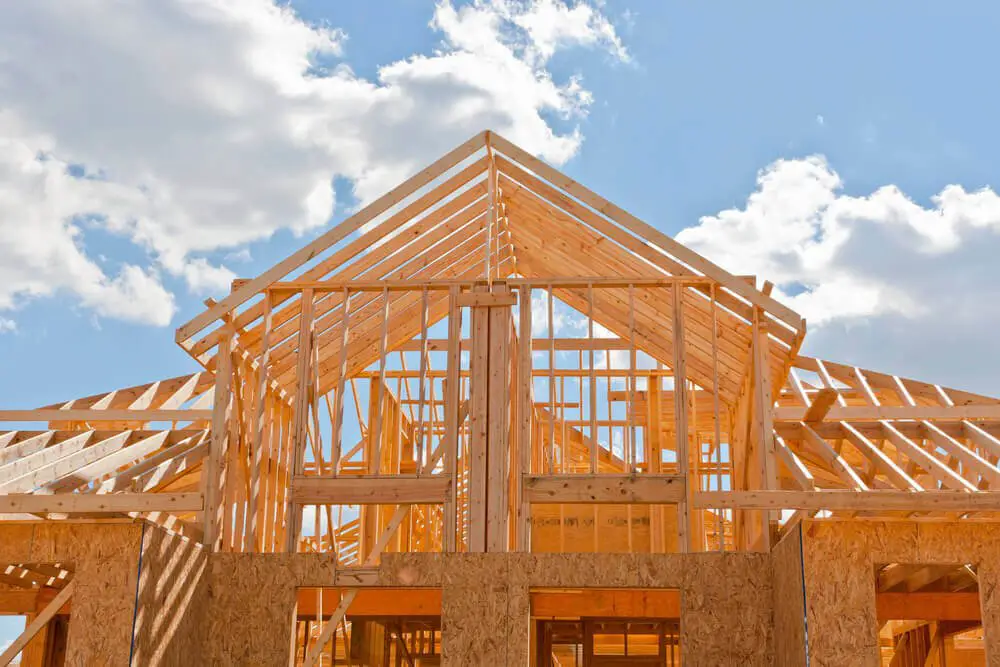Last Updated on August 5, 2023 By Emma W. Thomas
In many places, you can legally build your own house, but it depends on local building codes, permits, and regulations. Check with your local government or building authority to ensure compliance with all legal requirements before starting any construction project.
Can I Legally Build My Own House?
Building your own house is a dream for many aspiring homeowners. It allows you to have complete control over the design and construction process, ensuring your vision becomes a reality. However, before you embark on this exciting journey, there are important legal considerations to keep in mind. In this article, we explore whether it is legally possible to build your own house.
- Check local zoning laws:
The first step is to familiarize yourself with the zoning laws in your area. Zoning regulations dictate how land can be used, which includes restrictions on building new structures. Understanding these regulations will help you determine whether you can legally construct a house on your chosen property. - Obtain permits:
Building a house typically requires various permits and approvals from local authorities. These include permits for building, electrical, plumbing, and mechanical work. It’s crucial to apply for these permits before starting any construction to ensure you stay compliant with the law. Failure to obtain the necessary permits can lead to fines or having to tear down the structure. - Consider building codes:
Building codes outline the minimum safety and construction standards that must be met. These codes cover everything from foundation requirements to insulation standards and fire safety regulations. Familiarize yourself with the applicable building codes in your area and ensure that your house meets or exceeds the requirements. - Hire licensed professionals:
While it is tempting to do everything yourself, some tasks require the expertise of licensed professionals. For instance, electrical and plumbing work typically requires certified professionals to ensure safety and code compliance. Hiring licensed contractors not only ensures the work is done correctly but also satisfies any legal obligations. - Understand liability and insurance:
Building a house involves risks, and you need to protect yourself and your investment. Before construction begins, consider obtaining the appropriate liability insurance coverage. Insurance can safeguard against accidents, injuries, and damage that may occur during construction. It’s essential to consult an insurance professional to understand the coverage options available to you. - Consider property taxes and assessments:
Building a new house can affect your property taxes and assessments. Assessors calculate property taxes based on the value of your property, including any improvements. Moreover, construction can trigger reassessment, potentially resulting in higher property taxes. It’s crucial to consult with your local tax authority to understand the potential impact on your tax obligations. - DIY vs. hiring professionals:
Deciding whether to build your own house entirely or hire professionals is an important consideration. Building a home requires specialized skills, and even with the best intentions, mistakes can be costly. If you have the necessary experience and skills, taking on some tasks yourself can save money. However, enlisting professional help for critical aspects can ensure a higher level of quality and compliance.
Construction-Related Laws

Before you can embark on building your house, make sure that you are familiar with the laws applicable in the construction industry. This knowledge will help you get your desired outcome as well as avoid problems with the authorities. The following are worth knowing;
Lot Approval
Owning a piece of land does not give you the green light to do anything you want with it. Everyone needs to be careful before putting up a structure since laws can change over time. Before building your home, you need to get the records on the parcel of land. You can get the map, and the assessor’s parcel number (APN), and ensure that the land is approved for building.
If you do not know where to get the records in your area, you can search online. However, you can find them in the county recorder’s office, city hall, county courthouse, or tax assessor’s office.
Building Codes
It would be best if you familiarized yourself with building codes to know the details of the physical structures that are ideal in the land. In most countries, including the U.S., the codes are contained in IBC (International Building Code). These codes include fire prevention, the National electric code, and also international plumbing codes.
Areas that use the International Building Code (IBC) also adopt other included regulations. Your project’s contractor, engineer, or builder helps ensure that your structure does not violate the code. It is, however, important for you to search these codes to understand them. You can get them from your town or city’s building codes department or get to search for them online.
Zoning Laws
Zoning laws deal with land usage and the kind of buildings that are approved in the area. You can access this information from the city hall, local zoning office, or any other local planning board. Ensure that there are no regulations or restrictions that prohibit you from constructing your desired structure on your parcel.
Plans And Permits
Before you can remodel or build a house, you need to obtain a building permit. Make sure that you submit your plans to the local code office for approval. These plans will include measurements, drawings, floor plans, elevation views, and the exterior’s proposed materials. You can obtain the checklist from FEMA to learn more about the approval process and also the permits.
When you obtain the permit, the laws consider you as the project’s contractor and therefore liable for any building-related damages. Ensure that your team knows their responsibilities such as filing the permits and when this needs to be done. Don’t allow a contractor to mislead you about skipping this step.
If you are building a new home, you will require different permits for each system. You may need a plumbing permit to replace old pipes or install an underground sprinkler system. You may also require mechanical, grading, and electrical permits based on what you are building. Make sure to hire a skilled contractor to help pull all the necessary permits.
Covenants And Ordinances
When building your house, you don’t want any regulations and rules to interfere with progress. Make sure that your proposed structure complies with the local covenants and ordinances. While your zone may approve a certain kind of structure, the local ordinances could restrict the building’s height and size.
You will need to get written approval from your local municipal planning commission. You can visit the Department of Housing or any other local government office. If there is a Homeowners Association (HOA) in your area, make sure that your building complies with the neighborhood ordinances. You can obtain a copy of the agreements from the office of the local county assessor.
Which Is Better To Buy Or Build A House?
Buying a house may be easier than building one. But it requires one to have adequate time to search for the perfect home. You need to factor in the price, property taxes, location, market trends, home condition, and homeowners association fees. You may also need time to look for a home that has your specific features.
Advantages Of Buying A House
Buying an existing house has two primary advantages, i.e. cost and convenience.
Convenience
After your lender pre-approves you for a home loan, you can search around for the right home and make an offer. You can decide to use the services of a qualified real estate agent to help you look for the right properties. They will also guide you through negotiations and assist with paperwork. If the seller accepts your offer, you can close on the deal and move into the house within a short period.
While the home-buying process involves several steps like searching, financing, making offers, inspecting, and closing the deal, the convenience of buying a house is greater than building one.
Cost And Schedules
The desire to purchase a ready home may be high, especially if you are relocating for a new job or have a tight schedule. According to the National Association of Home Builders data, building an existing home is cheaper than building.
Freedom Of Choice
Buying a ready house will also give you the freedom to choose where to buy. You can move into an established neighborhood near your workplace, your kids’ school, or friends/family. You can buy a home with mature landscaping where you will not need to start a new lawn or plant trees and wait for them to grow.
Disadvantages Of Buying A Ready House
Buying an existing home has its downsides as well such as;
Limited Options
One of the major disadvantages of purchasing an existing house is that there are limited options. You may not get a property with all the features that you want. You may also not get a house that is in perfect condition and will, therefore need to do some repairs. You may be required to spend extra money to remodel the home to your specifications.
Benefits Of Building A New Home
While purchasing a ready house may be safer than constructing one, there are some benefits of building. The advantages include;
You Get What You Want
One of the major advantages of building your house is that you will get what you desire. You will the desired number of bedrooms, bathrooms, and other facilities that may not be available in an existing property.
You Can Create An Energy-Efficient Home
You can build an energy-efficient home that meets new heating, cooling, ventilation, air filtration, and insulation codes. An energy-efficient home helps you to save on utility bills, and it is also environmental-friendly.
Unlike older homes, a new house does not contain lead paint, asbestos, or mold, which can be harmful to your health. You can also build it with specific materials that make it better for the environment. You can use ‘green’ appliances, such as more efficient plumbing fixtures, toilets, and electrical fixtures to make your house more sustainable over time. A new home gives you the option of installing sleeves and wires to allow for future technological upgrades like solar and home automation.
You Can Recoup Your Investment
While the initial building costs can be higher, you can easily recoup your investment. If you are planning to sell your property in the future, you can get significant profits. Buyers are more attracted to new homes than older ones. A new home does not require many renovations and is less costly to maintain. You will therefore save both time and money since the home has a warranty.
A new home gives you some emotional and psychological satisfaction than you get from buying a house. You have the feeling that it is your invention that matches your personality and style.
Risks Involved In Building Your Own Home

Building your own home can be an exciting and rewarding experience. From choosing the perfect location to designing the layout and selecting the finishing touches, the prospect of creating your dream home is enticing. However, it is important to bear in mind that building your own home also comes with risks. Before embarking on this endeavor, it is crucial to understand and prepare for the challenges that lie ahead. In this listicle, we will explore some of the risks involved in building your own home.
1. Financial Concerns:
One of the biggest risks associated with building your own home is the potential for unexpected financial burdens. Construction costs can quickly escalate due to unforeseen issues such as site complications, material price fluctuations, or revisions to the initial plans. It is essential to have a comprehensive and realistic budget in place, allowing for contingencies to mitigate the financial risks involved in the construction process.
2. Construction Delays:
Building a home requires coordination among various parties, including architects, contractors, and suppliers. Delays may stem from weather conditions, permit issues, labor shortages, or setbacks in the delivery of materials. These delays can impact your timeline, increase costs, and create frustration. Being prepared for potential delays and setting realistic expectations can help manage this risk.
3. Regulatory Challenges:
Navigating through the labyrinth of building regulations and permits can be overwhelming for homeowners attempting to build their own homes. Failure to comply with local building codes or obtain necessary permits can lead to costly fines, further project delays, and even legal complications. Engaging professionals who are well-versed in local regulations can help you avoid unnecessary risks.
4. Quality Assurance:
Ensuring the construction of a high-quality home requires close monitoring and supervision throughout the building process. Lack of experience or knowledge in construction can expose you to the risk of subpar workmanship or using inferior materials. Hiring reputable contractors, conducting regular inspections, and researching material suppliers can help mitigate the risk of compromised quality in your home.
5. Potential for Environmental Issues:
Building a home can have a significant impact on the environment. Poorly planned construction projects may result in adverse effects on natural resources, ecosystems, or even neighboring properties. Understanding the environmental impact of your project and taking necessary precautions, such as implementing sustainable design practices or utilizing eco-friendly materials, can help minimize these risks.
6. Emotional and Physical Stress:
Building your own home can be an emotionally and physically demanding process. The stress of making crucial decisions, dealing with unexpected challenges, and managing the day-to-day details of construction can take a toll on your mental and physical well-being. Developing coping strategies, maintaining open lines of communication with your team, and seeking support from professionals or friends can help mitigate this risk.
Conclusion
You can legally build your own house, but there is a need for caution. Make sure that you are familiar with all the regulations and codes in your area. Ensure that the structure you intend to construct is compliant with all the laid down conditions in size, height, and usage.
References:
https://estimationqs.com/is-it-legal-to-build-your-own-house/
https://www.yourownarchitect.com/can-you-build-your-own-house-without-a-license/
Emma is a graduate of Domestic Science or Family and Consumer Sciences (Home Economics) from the University of Wisconsin. She has 7 years of experience Working with the strategic section of BestBuy and now writing full-time for Homeeon.
From Managing the Home, Interiors, Cleaning, and Exteriors to Gardening and everything about Making A Home Liveable – is her passion and this Homeeon is the result of this.
Emma loves decorating her home with the best stuff found online. She cares about quality over anything and writes reviews about them here in Homeeon. Get in touch with her over Pinterest.
Keep reading her blogs.

